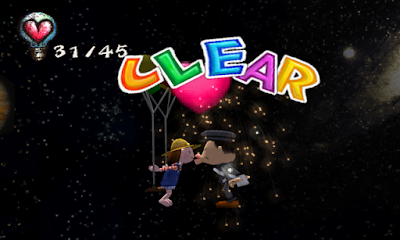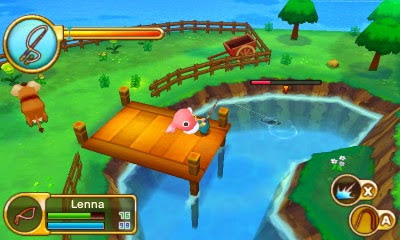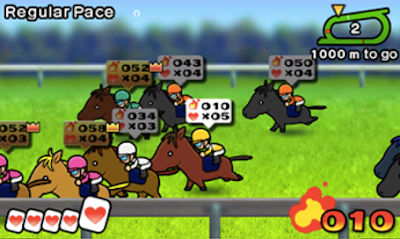My last two posts have focused on overlooked games for the Nintendo DS and 3DS--a pair of systems most people stopped buying games for and even playing years ago.
This post focuses on overlooked games for the Nintendo Switch, a system that, while definitely starting to show its age (it came out five years ago, after all), is far from done selling or being played.
So why write a post about overlooked games for a system that's still in or near its prime? My main motivator was that so many high-profile and highly regarded Switch games have released in the last five years that a ton of smaller, less acclaimed--but no less worth buying and playing--titles have gotten lost in the shuffle as a result.
Which ones? For me, the 15 discussed below more than qualify as overlooked or underappreciated Nintendo Switch games.
Black Bird
At first glance, Onion Games' Black Bird is little more than a ripoff of Sega's Fantasy Zone with a drab makeover (makeunder?). Dig beneath the surface and give it a proper chance, though, and you'll see there's a lot more to this side-scrolling, wrap-around shmup than copying key aspects of the aforementioned classic's gameplay. And I'm not simply talking about its otherworldly vaudevillian soundtrack. Black Bird features bullet-hell elements, for starters. It's also more strategic. Don't take my word for it, though; give it a try yourself, especially if you're any kind of fan of the genre.
Bravely Default II
Some will say calling Bravely Default II overlooked is a stretch; my response to those naysayers would be to compare how the masses embraced the original Bravely Default and the Switch's version of that game, Octopath Traveler, to how they've reacted to this title so far. Regardless, Bravely Default II is worth a look if you tend to like JRPGs--even if you've yet to experience its precursor. Sure, its visuals are kind of ugly, but they'll more than likely grow on you in time. And even if they don't, the other components on offer here--the fascinating story, the stunning setting, the rousing battles--are sure to do the trick.
Destiny Connect: Tick-Tock Travelers
A lot of Nippon Ichi Software (NIS from here on out) titles go unnoticed by mainstream game fans, but I think this one may take the cake in that regard, especially among the company's releases of the past decade. That's too bad, as Destiny Connect is one of the sweetest RPGs I've ever played. It also features time travel, a customizable robot party member, and a stellar soundtrack. The cherry on top for people like me who don't always have time for 60- to 100-hour adventures: Destiny Connect takes just 20 hours or so to finish.
Dungeon Encounters
When Dungeon Encounters was revealed, it looked like an absolute stinker. It proved to be anything but after spending a few hours with it, though. Yes, it's minimalistic to an almost shocking degree, but that just lets you focus on the addictively Etrian Odyssey-esque gameplay it offers all comers. This means you map out floors in Dungeon Encounters, as you might imagine, though the process is more straightforward and less involved than it is in Atlus' long-running series. The game balances out this slight (for some) by having players solve riddles to find new abilities, party members, treasures, and even the final boss.
Fuga: Melodies of Steel
Fuga: Melodies of Steel starts off seeming like the ultimate head-scratcher. The game follows a pack of furry children (young, anthropomorphic cats, to be more specific) piloting a giant tank against an onslaught of Nazi-esque dog-folk in the hopes of reuniting with their kidnapped loved ones. Once you accept its inherent weirdness, Fuga is a joy to behold. In particular, its tank-on-tank (or, more commonly, tank-on-two-or-three-tanks) action is strategic bliss. Fights here begin with a bit of rock, paper, scissors, but quickly blossom into something quite unique. They're surprisingly snappy, too, which makes the game feel like less of a slog than it otherwise might.
Gnosia
I've said this elsewhere a few times now, but here is it again: Gnosia is a Werewolf simulator. If that means nothing to you, Werewolf is a social-deduction game that models a conflict between a small group of murderous werewolves and a larger group of unsuspecting humans. This AI-operated take on the game is set in space and involves evil, alien-like creatures called Gnosia instead of werewolves, but everything else is the same. Gnosia is thrillingly executed, sending players through loop after loop--sometimes in the shoes of a human crewmember, sometimes as a Gnosia--to unravel its mysteries and unlock its gratifying conclusion.
Labyrinth of Refrain: Coven of Dusk
The main selling point of this NIS production seems to be that you can create a party of upwards of 40 members. I understand why that is, and the idea of it is pretty electrifying (even if it's less so in practice), but for me the real draws here are the unique traversal abilities, like jumping over chasms and breaking through walls, and the story that slowly, but satisfyingly, transitions from acerbic to touching.
The Liar Princess and the Blind Prince
This NIS creation is an accessible puzzler-platformer filled with lovely art, a blissful soundtrack, and a heart-breaking story. It's also the perfect length. A single playthrough takes just five or six hours, which means returning to it once or even twice a year is no bother at all. Doubt you'd ever do such a thing? Consider that I've already completed it four times. That's the kind of experience The Liar Princess and the Blind Prince provides those who give it a chance.
Mon Amour
The first time you play Mon Amour, you'll probably respond as I did and think to yourself, "this is cute, but I doubt I'll play it for very long." Since then, I've put a little over eight hours into it--which is pretty amazing when you consider a single runthrough takes 10 to 15 minutes, at most. Don't ignore Mon Amour because it looks like a kooky Flappy Bird knockoff, by the way. Although it seems the former was inspired by the latter, Mon Amour treads its own curious--and surprisingly strategic--path.
Overboard!
This eShop game bills itself as a "next-gen visual novel," but for me that description doesn't quite fit. While playing it, Overboard! feels more like an elaborate, modern, mystery-themed puzzle game. Your goal is to get away with murder by learning the movements and motivations of everyone else on board a cozy cruise ship and then using that information to your advantage. Overboard! is more interactive than your typical VN, as you may expect. Not only do you direct conversations, but you dictate where you go and when, as well as what you do once you're there. Succeeding as a murderer isn't easy, so you'll likely screw up a number of times before you nail it. Thankfully, a single playthrough often takes 30 minutes or less, so tackling it over and over again shouldn't be much of a problem.
Part Time UFO
Part Time UFO is the type of bite-sized gem that Nintendo used to plop onto the 3DS eShop with some regularity. Such releases have been nearly non-existent during the Switch era thus far, which is a shame. What makes Part Time UFO so special? Without trying to sound too superficial, its candy-coated visuals and syrupy sweet OST are chiefly to "blame," though the gameplay, which blends that of a claw crane with that of a balance-puzzler, deserves credit, too.
Raging Loop
Like the abovementioned Gnosia, Raging Loop's content cribs from Werewolf. It also has players (readers, if you prefer) go through several loops--though the ones in Raging Loop are far fewer and a lot longer than those in Gnosia. That's where the similarities between the two titles end, though. Otherwise, Raging Loop is very much a visual novel. This means a lot of reading, of course, but the story here is more than captivating enough to warrant it, plus you're regularly allowed to make decisions that impact how things play out.
SaGa Scarlet Grace: Ambitions
Final Fantasy V and SaGa Frontier have long been my all-time favorite RPGs, but this most recent entry in Square Enix's decades-spanning SaGa series is seriously giving both games a run for their money. SaGa Scarlet Grace does so many things differently than practically every other competitor in the JRPG space that I scarcely know where to begin in explaining what sets it apart. An obvious example is its battles, which are even flashier and more visceral than the ones in SaGa Frontier. Traversing Scarlet Grace's boardgame-like overworld is another highlight, as are its plethora of recruitable characters and its Kenji Ito-composed soundtrack.
Sushi Striker
I've been championing this indieszero-developed puzzle game since it was first announced, but it doesn't seem to have done an ounce of good. Sushi Striker is widely considered a bomb and a disappointment due to its overwhelmingly poor sales. Yet I continue to proclaim it's well worth the $15-ish you're likely to drop on a physical copy of the Switch release. (The 3DS version goes for less than $10.) Slinging plates of sushi at an endless parade of cartoonish enemies is a distinct thrill, and the story is bizarrely compelling. Bonus points go to its length and its better-than-it-has-any-right-to-be OST.
Void Terrarium
I don't know who at NIS came up with the brilliant idea to combine a roguelike with a (human) Tamagotchi, but I'd like to kiss them. The result of their brainstorm is one of the most enjoyable examples of the genre I've played in years. Further helping matters is Void Terrarium's bleak-but-intriguing post-apocalyptic setting and its crunchy, industrial-tinged soundtrack.
Honorable mentions: Dandy Dungeon, Famicom Detective Club: The Girl Who Stands Behind, Lapis x Labyrinth, Mad Rat Dead, Space Dave!




























